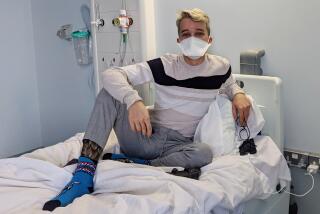Virus Infects 5 Vaccinated Volunteers in AIDS Study
CHICAGO — At least five volunteers in the government’s principal AIDS immunization study have become infected with the virus, despite having been vaccinated, the Chicago Tribune reported today.
The matter is further evidence that the search for an AIDS vaccine is not as promising as scientists had first hoped.
Last November, scientists found that while people who had been vaccinated were protected against the AIDS virus grown in a laboratory, their blood could not wage an attack against a virus taken from infected people.
Researchers also are worried about the remote chance that the vaccine could make the immune system more vulnerable to infection with the virus. In addition, there is the possibility that the vaccine is effective only against certain strains of the virus.
The vaccines being tested contain only a piece of the AIDS virus. In theory, such vaccines generate antibodies that attack and neutralize the entire AIDS virus should it later appear.
Each of the five vaccinated subjects who later became infected, previously had developed normal levels of HIV antibodies.
“There was nothing unusual about the responses of these individuals. Nothing stands out about their response to the vaccine,” said Dr. Jack Killen, the National Institutes of Health official in charge of the vaccine trials.
Two of the five infected were considered to be at low risk for catching the virus. The other three were considered at high risk, meaning they had traits or behavior patterns that made them more likely to be exposed to the HIV virus than most people.
Four of the five infections, Killen said, have occurred in volunteers given a vaccine made by Genentech or by Biocene, both based in California.
The five cases have been discussed at scientific meetings, one in Washington in which researchers debated whether the NIH should continue plans to test the vaccine on thousands of new uninfected volunteers.
“We just don’t know what we’re going to do,” Killen said.
The trials are designed to test the safety and immune response of the vaccines, not their effectiveness in preventing infection.
About 1,400 volunteers have enrolled in the vaccine trials at five universities. The vaccines are under consideration for use in the expanded trials, but if further trials take place, they may include only 5,000 new volunteers instead of the 10,000 previously planned, the newspaper reported.
More to Read
Sign up for Essential California
The most important California stories and recommendations in your inbox every morning.
You may occasionally receive promotional content from the Los Angeles Times.










